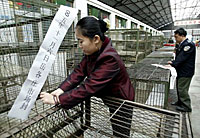




HONG KONG—Authorities in the central Chinese province of Henan are holding more than 400 university students in isolation after they contracted a mystery fever. Meanwhile, authorities in Shanghai have called for better preparedness as the highly pathogenic avian influenza spreads.
The students, from the Henan University of Science and Technology in the city of Luoyang, were being held at an undisclosed location other than the university hospital, a local employee said, confirming earlier official media reports.
“The students with high fever symptoms are quarantined...at a specific place,” an employee at the No. 1 University Hospital told RFA’s Cantonese service. “But we don’t know how many students are there now.”
Official media reports were also confirmed by an official on duty at the university.
“We have more than a dozen students with high fever symptoms,” the official said, after initially denying the story that was reported by the official Chinese news agency, Xinhua.
“Most of them are out of hospital already. We don’t know the details,” the official said.
The World Health Organization (WHO) has requested further information on the outbreak from Chinese authorities.
Meanwhile, Shanghai mayor Chen Liangyu has warned municipal officials of a disastrous impact on the city of any epidemic among humans caused by the H5N1 avian influenza virus.
Any epidemic outbreak due to our failure in taking strong and effective preventive, control, and monitoring measures would probably produce great negative impacts.
A 29-year-old woman migrant worker died of a suspected bird flu infection in the city last month, prompting the city to step up inspections of poultry shipments from out of town.
“We should fully understand the grimness and the arduousness of our work of preventing and controlling highly pathogenic avian influenza,” Chen told a municipal Communist Party committee meeting.
“Shanghai is a modern international metropolis, and any epidemic outbreak due to our failure in taking strong and effective preventive, control, and monitoring measures would probably produce great negative impacts,” Chen said.
Burma’s secretive junta has announced bans on the sale and movement of poultry in a number of townships in its Sagaing and Mandalay divisions, official media reported.
“Altogether 3,427 fowls and 200 quails were killed in 37 poultry farms and two quail farms from the first week of February to second week of March 2006 and 5,122 were destroyed,” the Rangoon-based New Light of Myanmar newspaper reported in March.
Bird flu has spread rapidly since late 2003 from Asia to Europe, the Middle East, and Africa. The United States fears it will arrive on its shores before year's end.
Since the virus re-emerged in Asia in 2003, outbreaks have been confirmed in more than 45 countries and territories, according to data from the World Organization for Animal Health.
In total, the virus is known to have infected 190 people since 2003, according to the WHO.
Many of those who have died are children and young adults. Vietnam and Indonesia have reported the highest number of cases, accounting for 64 of the total deaths.
Original reporting in Cantonese by Lei King-man. RFA Cantonese service director: Shiny Li. Written for the Web in English by Luisetta Mudie. Edited by Sarah Jackson-Han.